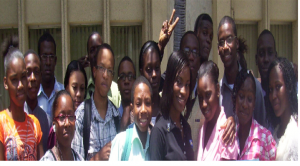
Battle of the Sexes – Who is Underachieving?
June 12th, 2015
By Cynthia Hobbs and Justine Stewart
Yes, it’s true. A higher percentage of girls than boys obtain passes in the regional Caribbean Secondary Education Council/CSEC Examinations (used as a secondary school leaving exam) in most subject areas. However, in key subjects such as mathematics, more than half of all Jamaican candidates failed in 2013, regardless of sex. Though boys underperform in relation to girls, what is clear is that both boys and girls show low levels of academic achievement and have room for improvement. Therefore, the education system should be striving for excellence for all.
It is important to demand excellence because expectations motivate students; a teacher’s expectations can become a self-fulfilling prophecy. In fact, the link between better learning outcomes and teacher attitudes and expectations towards their students exists regardless of a schools’ socioeconomic background. For instance, an IDB-funded study showed that effective schools in Jamaica engender a culture of high expectation.
How do you raise excellence for everyone? And, should interventions differ according to sex? Although a gendered approach is often talked about, leading experts in Jamaica found that socio-economic background is a greater predictor of school success than sex. And the reality is that the achievement disparity evidenced in school does not translate directly into the work force. Males in Jamaica have higher wage earning potential at all levels of educational achievement compared to females, and males have lower unemployment rates at all ages.
There are economic and social costs linked to under-participation and underperformance, such as dropping out of school, increased engagement in risky behaviours like crime and violence, and lower wages. For this reason, there is a need to address underachievement of both boys and girls. Studies show that strong leadership and good teaching can make a positive difference in student achievement. Here are some other strategies:
- Increased involvement of parents in the education of their children to provide support and motivation;
- Teaching of targeted skills, improvement in life skills, and meaningful work experience placement;
- Improvements in basic literacy and numeracy skills; and
- Pedagogical support to teachers to identify learning styles of students and apply differentiated teaching strategies to meet the diverse learning needs of their students.
There is no denying that across the English-speaking Caribbean boys are higher underachievers, but in striving for excellence, both boys and girls should be winners.
Tags: Caribbean Secondary Education Council, CSEC Examinations, education, Jamaica
The Gleaner reserves the right not to publish comments that may be deemed libelous, derogatory or indecent.
To respond to The Gleaner please use the feedback form.
- Three ways the Caribbean can strengthen financing for private companies
- Learning about Jamaica’s Forests by Hiking the Blue Mountains
- Making People Happy
- US Supreme Court: One Less Known Example of How a Supreme Court Decision, Shapes Up Judiciary Reality in the Caribbean
- Crime in Paradise: Preview of Forthcoming IDB Study on Crime in the Caribbean
- Caribbean Diaspora: How Can They Finance Development in the Region?
- Zika Virus and the Economic and Human Reproductive Health Implications for the Caribbean
- Proper Solid Waste Management Involves all of us
- Victimization surveys: 3 common mistakes to avoid
- Social Innovation: The way forward for Civil Society Organizations


